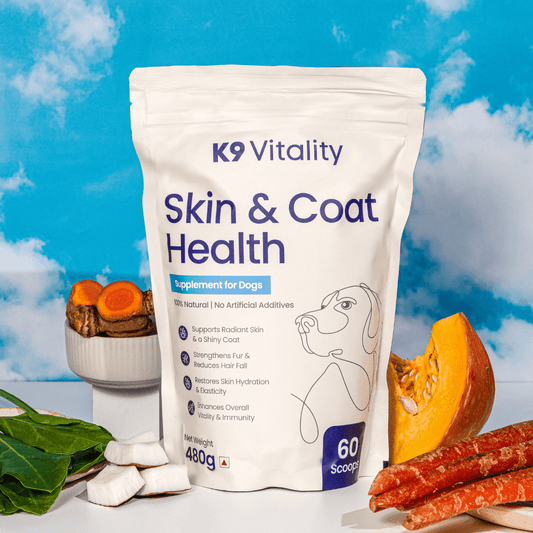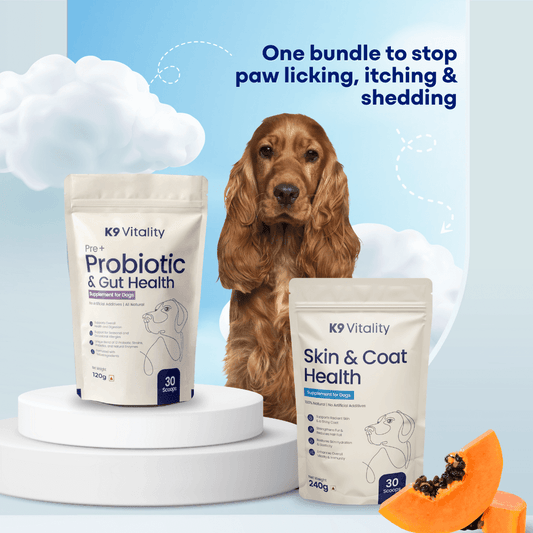
Probiotics for Dogs: Understanding the Benefits!
Share
As a pet owner, you are always searching for ways to keep your beloved dog healthy and happy. Regular vet visits, balanced diet, regular exercise, you do your best to provide the care they need. But have you ever considered adding probiotics to your dog’s wellness routine?
Probiotics for dogs have gained popularity in recent years, and for good reason. These beneficial bacteria offer a range of health benefits that can improve your dog’s overall well-being.
In this article, we will dive into the world of probiotics and explore the many benefits they bring to your dog.
What are Probiotics for Dogs?

Probiotics are living microorganisms that provide health benefits when consumed. They are most commonly found in certain foods or taken as supplements. The term probiotics refers to the beneficial bacteria and yeasts that naturally reside in the body, especially in the digestive system. These microorganisms play a crucial role in maintaining a healthy balance of gut bacteria which is essential for proper digestion and overall health.
The Benefits of Probiotics for Dogs
- Improved Digestive Health - One of the main reasons pet owners turn to probiotics is to support their dog's digestive health. Just like humans, dogs can experience digestive issues, such as diarrhea, constipation and irritable bowel syndrome. Introducing probiotics to their diet can help restore the balance of good bacteria in the gut, helping in digestion and reducing digestive issues. Probiotics work by promoting the growth of beneficial bacteria and inhibiting the growth of harmful bacteria and maintaining a healthy pH level in the gut.
- Enhanced Immune Function - A strong immune system is vital for your dog's overall health and well-being. Probiotics play an important role in enhancing immune function by stimulating the production of immune cells and supporting the gut-associated lymphoid tissue (GALT) which is a critical part of the immune system. By maintaining a healthy gut microbiome, probiotics can help your dog fight off infections, allergies, and other immune-related disorders.
- Reduced Inflammation - Inflammation is a natural response to injury or infection but chronic inflammation can lead to various health issues. Probiotics have been shown to have anti-inflammatory properties, helping to reduce inflammation in the body and mitigate the risks associated with chronic inflammation. By reducing inflammation, probiotics can contribute to a healthier and more comfortable life for your dog.
- Improved Skin and Coat Health - Skin issues, such as itching, dryness, and allergies, can cause significant discomfort for your dog. Probiotics have shown promising results in improving skin and coat health. Since the gut and skin are closely connected, a healthy gut microbiome can help reduce inflammation and improve conditions like dermatitis or allergies resulting in healthier skin and a shinier coat for your furry friend.
- Reduced Anxiety and Stress - Probiotics can also help with your dog's emotional well-being. The gut and brain are intimately connected through the gut-brain axis and imbalances in the gut microbiome can affect mental health. By promoting a healthy gut environment, probiotics can help reduce anxiety and stress in dogs. This is particularly beneficial for dogs with separation anxiety, fear of loud noises, or those experiencing stressful situations like traveling or moving.
Choosing the Right Probiotics for Your Dog
When choosing probiotics for your dog, it's important to consider a few key factors to ensure you are providing them with the most suitable option:
-
Look for Reliable Brands: Choose probiotics from reputable manufacturers that specialize in pet health. Read reviews and seek recommendations from veterinarians or other pet owners.
-
Consider Strain Diversity: Different strains of bacteria offer various benefits. Look for a probiotic supplement that contains a variety of strains to address different aspects of your dog's health.
-
CFU Count: CFU stands for Colony Forming Units, which measures the number of viable bacteria in each dose. Higher CFU counts generally indicate a more potent and effective probiotic supplement.
-
Consider Specialized Formulations: Certain probiotic formulations are designed to target specific health concerns. For example, if your dog suffers from skin allergies there are probiotics available that focus on improving skin health.
-
Seek Veterinary Guidance: Consult with your veterinarian before starting your dog on any new supplement or dietary change. They can provide advice tailored to your dog's specific needs and health conditions.
Do not worry, we have done the research for you and here is the best Probiotic for your dog. Click here to know more!

Introducing Probiotics to Your Dog
Before incorporating probiotics into your dog's routine, it is essential to consult with your veterinarian. While probiotics are generally considered safe for dogs, there may be specific considerations to be aware of especially if your dog has an underlying health condition or a past history.
When starting probiotics, it's recommended to begin with a lower dose and gradually increase it over time. This allows your dog's digestive system to adjust to the new addition. You can introduce probiotics through specially formulated dog food, probiotic treats, or supplements that can be added in their regular food.
Monitoring Your Dog's Progress
As with any dietary addition or change, it's important to monitor your dog's response to probiotics. Keep an eye out for any changes in their digestion, stool consistency, energy levels or overall well-being. If you notice any adverse effects or your dog's condition worsens, consult with your veterinarian for further guidance.
Incorporating Probiotics into a Holistic Approach
Probiotics are not a magical cure-all, and they work best when combined with a holistic approach to your dog's health. Along with probiotics, ensure your dog receives a balanced and nutritious diet, regular exercise, and plenty of fresh water. Regular veterinary check-ups are also crucial for maintaining their overall well-being.

Conclusion
Probiotics offer numerous benefits for dogs, supporting their digestive health, boosting immune function, reducing inflammation, improving skin and coat health, and even alleviating anxiety and stress. Introducing probiotics to your dog's wellness routine can be a valuable step towards enhancing their overall quality of life. However, every dog is different, so it's important to consult with your veterinarian to determine the most suitable probiotic option for your furry friend. With the right choice and proper administration, probiotics can be an excellent addition to your dog's health regimen, ensuring they live a happy and healthy life by your side.






